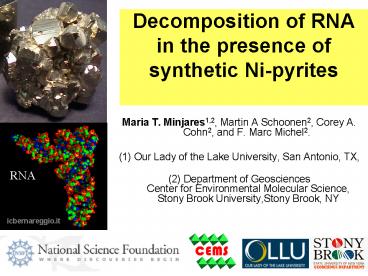Decomposition of RNA in the presence of synthetic Nipyrites - PowerPoint PPT Presentation
1 / 17
Title: Decomposition of RNA in the presence of synthetic Nipyrites
1
Decomposition of RNA in the presence of synthetic
Ni-pyrites
- Maria T. Minjares1,2, Martin A Schoonen2, Corey
A. Cohn2, and F. Marc Michel2. - Our Lady of the Lake University, San Antonio,
TX, - Department of Geosciences Center for
Environmental Molecular Science, Stony Brook
University,Stony Brook, NY
2
Outline
- Motivation of study
- Synthesis of Ni-pyrites
- Batch Experiments
- Results
- Conclusion
NiS2
FeS2
3
Background
- Ni compounds, such as Ni-OH phases, Ni-oxides,
and Ni3S2, are known carcinogens - Many of these Ni compounds are known to degrade
nucleic acids. - NiS2 is iso-structural to FeS2 and the two phases
form a solid solution. - Pyrite, FeS2, has recently been shown to degrade
RNA (Cohn et al. EPSL 04).
4
Pyrite-RNA interaction
5
Motivation Fe-Ni-S2 as a model system
- Research QuestionHow does the addition of Ni to
pyrite affect its reactivity toward RNA? - Strategy
- synthesize Ni-Fe-S2 compounds with different
Ni/Fe ratio as well as endmembers - conduct a series of batch kinetic experiments to
determine the rate of RNA degradation.
6
Hydrothermal Synthesis
- Reagents Fe(NH4)2(SO4).6H20, NiCl2, Na2S.9H2O,
S(0). - Starting reagents dissolved in N2-purged DI
H2O,loaded in 316 SS hydrothermal vessel lined
with teflon insert at room tempature - Heated to 200C for 5 to 7 days. Shaken during
aging. - Samples recovered in anaerobic glovebox,
characterized with XRD and SEM
7
Synthesis Setup
Oven and shaker
TEFLON insert
135 mL vessel
Anaerobic glovebox
8
CharacterizationNi-Doped Pyrite Solid State
Solution
- Shift in vaesite peaks
- Small traces of pyrite
- Indicates solid solution
9
CharacterizationMixed Phases
- Slight shift in vaesite peaks
10
Scanning Electron Microscopy (SEM)
FeS2 120hrs _at_ 198oC 26.96 KX
Fe0.25Ni0.75S2 85hrs _at_198oC 67.14 KX
Fe0.5Ni0.5S2 115hrs _at_ 192oC 52.37 KX
Fe0.75Ni0.25S2 93 hrs _at_ oC 16.85 KX
11
RNA Exposure to Ni-pyrites
- Batch experiments conducted in anaerobic
glovebox - RNA concentration analyzed using Ribogreen
- Ribogreen is a molecular probe that intercalates
in winding of RNA helix and then becomes
flourescent. Intercalation is inhibited if RNA
is degraded in small fragments. Strength
fluorescence signal proportional to concentration
of in tact RNA. - Also collected UV-Vis spectra for filtered
solutions.
12
Data
Note that RNA is rapidly decomposed in presence
of Ni-rich phases
13
Rate first order in RNA
14
Effect of Ni on Rate
15
Fate of RNA
A260 due to base
A260 lost as base reacts with OH radical
16
CONCLUSIONS
- Ni promotes the decomposition of RNA
- Mechanism likely to involve OH radicals
- First time that Ni-Fe-S2 phases have been studied
- Ni-pyrites may be more harmful than pure pyrite
- Thanks NSF-Chemistry for support.
17
2004 CEMS Summer Scholars































